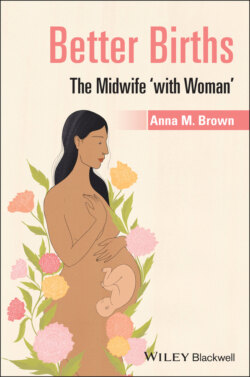Читать книгу Better Births - Anna Brown - Страница 35
Donna's Stories Rosie*'s Story
ОглавлениеBeing a community‐based midwife, means that our contact with women is on a one‐to‐one basis, outside of the hospital environment. Often in GP surgeries, clinics or women's homes. As such, we have the opportunity to bond with the women in our care and provide them with not only clinical care but continuity, friendship and support in a way that is less possible within a busy hospital‐based setting.
I have found that having had the opportunity to build relationships with women during their pregnancy, they will seek my support more willingly than other healthcare professionals as there is a level of trust that has been built.
I recently saw Rosie for her antenatal check. I could tell the moment she came into my room that she was distressed, as was her partner John. They had received the news that their baby was very likely to have a life‐limiting condition. They had attended a number of scans to confirm this, and only a matter of days before hand, had the confirmed diagnosis. Although they had been given the clinical outlook from the medical professionals they had seen, in their words: ‘no‐one had given them the space to understand what this would mean for them, and what their choices were’.
This is not normally a conversation held in a community setting, as there are specialist healthcare professionals that are trained in this field; but they wanted my support. From a deeply personal perspective as a mother I was desperately upset for them, while also knowing the clinic appointments are only 20 minutes long, and I knew that this was not going to be a quick chat and I had a busy clinic. I was worried that I wouldn't have all the answers, but I gave them the space to talk about everything that had happened. Rosie cried, and John just held his head in his hands. Sometimes all the clinical training in the world can't give you the words for a time like this. I held Rosie's hand and asked how I could help. She needed someone to talk to her in ‘lay’ terms; simply to discuss what their options were.
I gave the couple what information I was able to and then made phone calls to the relevant support teams to get advice. There were no decisions made in the room at that point, but I assured Rosie she had my support in whatever decision she made. They left with a clear idea of what their options were, and in circumstances like this, that is whether to continue the pregnancy or not.
I have to be honest that when I started my midwifery journey, I had ‘rose coloured spectacles’ about the role of a midwife, bringing new life into the world. I still have a great belief that all birth is sacred, but there are times when my personal and professional beliefs are challenged. No textbook or hospital policy can give you the insight needed to deal with deeply emotional situations such as talking to a woman about whether or not to continue her pregnancy. I could only support Rosie in the right choice for her. I told her she was a brave woman who would make the right decision for her and her baby and family.
Forty‐five minutes later the couple left the clinic, and I cried on my own. There were now two women in the waiting room, eagerly waiting for my care and attention to discuss their continuing pregnancies. I composed myself and carried on with clinic, apologising to everyone for the rest of the clinic about being late, but assuring them that they would have my care attention for however long they need it.
Being a midwife is a privilege, walking ‘with women’ at every point during their pregnancy, birth and beyond and is often full of pure joy and the wonder of new life, yet can be interspersed with tragic and ethically challenging moments where the support of a midwife is second to none.
